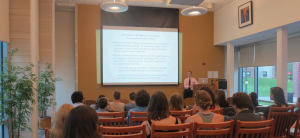Ellie Gavin || Campus Life Editor
This Thursday, Professor Avery Tompkins, PhD, came to Boncheck College house to give a talk entitled: “Transgender Inclusivity in the Academy: Campus Policies and Practices.” The talk was a part of F&M’s Civil Rights and Social Changes Programs Series, an initiative dedicated to bringing speakers to campus who can help educate students on social issues facing this generation.
Tompkins is a visiting assistant professor of Sociology and Women’s Studies. In addition, he is a Bingham Diversity Fellow at Transylvania University. His research has been published in the Journal of Homosexuality, Transgender Studies Quarterly, and QED: A Journal in GLBTQ Worldmaking.
Tompkins started by providing insight into the unsettling statistics about the lives of collegiate transgender individuals. According to Tompkins, one study found that 35 percent of transgender individuals experience abuse while attending a college or university, five percent of which is physical, and three percent of which are sexual.
Despite these grim statistics, Tompkins emphasized that there are many extremely simple things colleges can do to improve the college experiences of transgender students.
One of the simplest things that a college, or any institution, can do to be more inclusive of those who do not fall into the standard gender binary is on their paperwork. Instead of checking a box, male or female, to indicate gender, they can instead put a blank line for the respondent to fill-in how they identify.
“Most people will write male or female. Seriously, 95 percent of people are going to write male or female,” Tompkins says. “But for those people who really don’t identify as male or female… that line means everything.”
One of the biggest issues that transgender student face is getting appropriate housing. According to Tompkins, 19 percent of transgender individuals report being denied access to gender-appropriate housing. He suggests not only that colleges make all dorms and all halls gender inclusive, but also that colleges give the option for people to room with an individual of any gender. He said that this not only helps transgender people coming into college, but that it also helps people who may redefine their gender identity later on.
“If they really love their roommate and they get along really well, and somebody ends up transitioning, they shouldn’t have to move out and not live with that person. Thats sort of problematic, right?,” Tompkins said. “Having gender inclusive housing can really foster some great relationships between all people on campus.”
Along the same lines as housing, Tompkins pointed out that gender-inclusive bathrooms are a great way to make transgender people feel more comfortable at school. Tompkins recognizes that many people are concerned that women may be at risk of sexual harassment or assault if bathrooms are not single-sex. However, this concern is largely baseless.
“The research actually shows that co-ed, or gender inclusive bathrooms are actually safer bathrooms, and this is due to the fact that there could be more people in the bathroom at one time, so it’s less likely that anybody would be cornered in the bathroom,” Tompkins said.
He goes on to point out that single-sex bathroom do not provide as much security as one might think. “Just because there’s a sign on the door that says women, [that doesn’t mean] that it keeps other people out. It’s a sign. That is not a locked door,” Tompkins said.
Tompkins goes on to say that all individuals, regardless of gender identity, would be safest in a single-stall, gender-neutral bathroom, with a dor to the floor that locks. However, he points out that the single-sex bathrooms that currently exist are not this way.
Tompkins said, “A door that says ‘women’ provides zero safety. It provides an illusion of safety… it is an unlocked door.”
In order to foster inclusivity and make college campuses safer and more comfortable for all, Tompkins encouraged people to ask questions and get educated.
“It is important for people to take ownership over their own education and to ask for help when needed,” Tompkins said.
While Tompkins stressed that it is not the job of transgender people to educate people about their identity, if people have knowledge or experiences that they feel comfortable sharing, spreading knowledge is a great way to end ignorance about the transgender community.
“So, I encourage people who know a little bit more to be available to those who are still learning,” Tompkins said.
Sophomore Ellie Gavin is the Campus Life Editor. Her email is fgavin@fandm.edu.